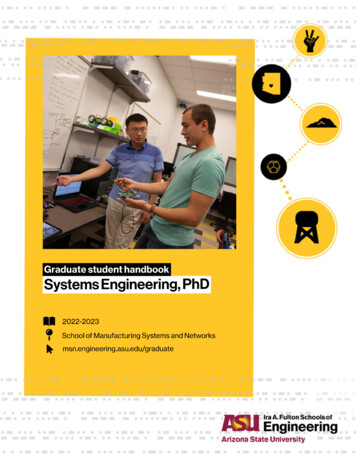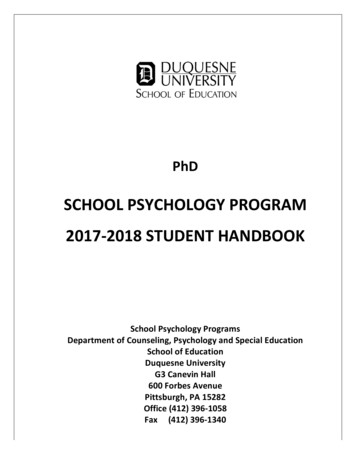
Transcription
neering.asu.edu/graduate
Systems Engineering, PhD2022-2023TABLE OF CONTENTSPhD Systems Engineering. 4Program Overview . 4Admission Requirements . 5Program Requirements. 7Master in Passing (MIP) . 10Milestones for Obtaining the PhD . 11Milestones and Timeframes for BS-to-PhD and MS-to-PhD . 16Faculty. 17Academic and Faculty Advising . 20Policies for Evaluation and Dismissal . 20Recommended Campus Resources . 21The School of Manufacturing Systems and Networks Overview. 22About the School of Manufacturing Systems and Networks . 22Graduate Programs . 22Purpose of this Handbook . 23Student Responsibility . 23Diversity and Inclusion Initiative . 23Facilities & Labs . 23Faculty. 24Assistantships . 24Graduate Advising . 24Academic Standards and Policies . 24Grades . 24Academic Performance Standards . 24Evaluation of Academic Performance Requirements . 26Plan of Study (iPOS) . 27Time Limit for Degree Completion . 28Continuous Enrollment and Leave of Absence Policies . 28Internships . 292
Graduate College Policies and Procedures . 29Policy on Maximum Courseload . 29Applying for Graduation . 29General ASU Information. 29Academic Calendar . 29Student Code of Conduct . 29Prohibition Against Discrimination, Harassment, and Retaliation . 30Academic Integrity . 30Department & University Resources . 30Contact Information . 31Appendix A . 32Plan of Study Outline: BS to PhD . 33Appendix B . 36Plan of Study Outline: MS to PhD . 37Appendix C . 40Comprehensive Exam Results Form . 413
PhD Systems EngineeringProgram OverviewThe Doctor of Philosophy (PhD) in Systems Engineering is a trans-disciplinary graduate programoffered by The School of Manufacturing Systems and Networks. The program is aimed atadvancing the understanding of complex engineering systems, where these systems areinclusive of technological aspects as well as social, cultural, environmental, and other interactingcomponents that impact the input, output, and interactions within a system. The program willprepare students to identify, model, analyze, interpret, optimize and manage themultidimensional interactions of the ever-increasing complexity of modern societal andtechnological challenges. A typical incoming student in this program would have a master’sdegree in engineering or related discipline. Students will be required to complete a core of threecourses of three credits each. The core provides the foundation for systems thinking, systemsidentification, systems modeling, systems design and analysis, and perspective taking usingdiverse disciplinary methodological approaches. Students graduating from this PhD degreeprogram will possess the necessary expertise to advance systems integration of key industryand government sectors, and to contribute to the body of knowledge on interdisciplinarymethods, techniques, and strategies for designing and managing complex systems over their lifecycle.Possible discipline areas include: Automotive Systems EngineeringEnergy Systems EngineeringEnvironmental Systems EngineeringManufacturing Systems EngineeringRobotics Systems EngineeringSoftware Systems EngineeringThis handbook has been developed for students that are enrolled in or considering applying foradmission to the PhD in Systems Engineering degree program in the School of ManufacturingSystems and Networks. The objective is to provide program specific information regardingadmissions, curricular requirements and both university and programmatic policies andprocedures. As such, this handbook is complimentary to the School of Manufacturing Systemsand Networks Graduate Handbook and to the ASU Graduate College Policies and ProceduresHandbook. It is the responsibility of the student to obtain and familiarize themselves with thesedocuments.The program is in the School of Manufacturing Systems and Networks, one of the seven FultonSchools of Engineering. The program webpage can be found -engineering-phd/.4
Admission RequirementsAdmission to the PhD in Systems Engineering program requires the completion of all generaladmission requirements and procedures set forth by Graduate Admission Services. For generalinformation on applications, deadlines, international requirements, application requirements, andother information, please see Graduate Admission Services. Prior to submitting an application toGraduate Admission Services, applicants should review the information provided in this handbookregarding the degree program, including specific application requirements and deadlines.Submission of an ApplicationFor admission information and procedures, review the How and When to Apply For GraduateAdmission website. Applications for all graduate degree programs and non-degree status must besubmitted via the application website.Admitted students who are unable to start their programs in their admitted term can request to defertheir start to the next admissible semester. Deferrals may impact student funding and are subject tofaculty approval. Students may submit a request to defer through their MyASU.Application DeadlinesComplete applications must be received by the application deadline for full consideration.Fall semester (August)Spring semester (January)January 15August 1Admission and EligibilityAdmission to the PhD in Systems Engineering program requires completion of a Bachelor or Masterof Science degree in an Engineering discipline or a closely related field from a regionally accreditedinstitution or the equivalent from an international institution that is officially recognized by thatcountry in engineering, physical sciences, mathematics or a similar field. In addition to an applicableMaster’s degree, admission requires a minimum of a 3.0 cumulative GPA (scale is 4.0 A) in theMaster’s degree program. The number of students admitted to the program is limited, and admissionis, as a consequence, competitive.In addition, students that have demonstrated exceptionally good performance in their undergraduateprograms can, upon completion of their BS in Engineering, be admitted to the direct BS to PhDprogram. This track requires a cumulative undergraduate GPA of 3.50/4.0 or better coupled with arecord of research and/or leadership accomplishments.Applicants must meet the following admission requirements: A bachelor’s and/or master’s degree in engineering, physical sciences, mathematics or asimilar field.5
Minimum of a 3.00 cumulative GPA (scale is 4.0 A) in the last 60 hours of a student’s firstbachelor’s degree program. Minimum of 3.00 cumulative GPA (scale is 4.00 A) in graduate work, if applicable Official transcripts from undergraduate and graduate programs Official GRE general exam scoreso A GRE Waiver may be requested for PhD Systems Engineering applicants with a completed undergraduate engineering degree from a U.S. ABET accreditedundergraduate program with 3.0 cumulative GPA, or applicants with a completedMS degree from a U.S. ABET accredited undergraduate program.Two (2) letters of recommendation (at least one of which must be a faculty member at aninstitution attended by the applicant)A professional CV/resumeStatement of research interests as part of the online admissions applicationInternational applicants must also meet the English proficiency requirements, asdefined by Graduate Admission Services. Please be sure to review the TOEFL, IELTS,Duolingo, or PTE score requirements, as your application will not be processed withoutvalid proof of English proficiency.For students with a BS applying for PhD program directly, a letter of support from theEngineering faculty interested in supervising/chairing the committee is required.A complete PhD Systems Engineering application for admission includes the following items: An online Graduate Admission application, including attachments of the followingdocuments:o Resume or CVo 300-500 word Statement of Research Interests (more details in onlineapplication)o Writing Sample (more details in online application) Transcripts from each college and/or university attendedo Unofficial transcripts can be uploaded directly to the online application. Officialtranscripts will be required if admitted. Official GRE general exam scores International applicants must also meet the English proficiency requirements, asdefined by Graduate Admission Services. Please be sure to review the TOEFL, IELTS, orPTE score requirements, as International applications will not be processed without validproof of English proficiency.Evaluation of ApplicationsThere are many factors that will be considered in evaluation of applicants for this program. Theseinclude cumulative GPA, institutions the applicant has attended, the Statement of ResearchInterests, writing sample, research experience, letters of recommendation, performance on the GREand other standardized tests, performance in individual courses, and the number of positionsavailable in the program.6
Academic units submit recommendations regarding admission decisions to Graduate AdmissionServices; only the Dean of Graduate Admission can make formal offers of admission. Applicants areable to monitor the status of their application through My ASU. If admitted, the formal letter ofadmission can be downloaded from My ASU. If denied admission, letters are sent via email to theaddress on record.Financial Aid Funding OpportunitiesSeveral resources are available to help students understand how to finance a graduate degree. Werecommend visiting Pay for your Graduate Education via Graduate College, and Paying forCollege via Financial Aid and Scholarship Services. For an estimated cost of enrollment, visit:Standard Cost of Attendance.The Funding Opportunities page within the School of Manufacturing Systems and Networks site isintended to be a resource for doctoral students to learn more about funding and fellowshipopportunities. Additionally, students may also review the Fellowships and Funding page for theFulton Schools of Engineering.Research Assistantships (RA) and Teaching Assistantships (TA) may be available but are not aguarantee with admission. If assistantships are available, the positions are managed within theprogram’s department. Interested students should discuss their research interests with the SystemsEngineering faculty members.Program RequirementsThe PhD degree is the highest academic credential conferred by the University. Attainment of a PhDrequires that a student demonstrates the capacity to produce and sustain original independentresearch in the chosen field and that this research be validated through at least two examples ofrespected external endorsements indicating that the research has produced significant results.Examples include two or more publications in reputable peer reviewed journals, publication in two ormore highly reviewed and exclusive conference proceedings, issuance of patents based on theresearch, or a combination of these measures. It is the responsibility of the student and thecommittee chair to establish the efficacy of the research within the broader academy before the finaloral defense is scheduled. The process and curriculum described below is designed to lead studentsthrough the attainment of a high degree of technical maturity, into candidacy, and finally to theproduction and oral defense of a written dissertation.The PhD degree requires a minimum of 84 credit hours beyond the bachelor’s degree, not includingdeficiency courses. A maximum of 30 credits can be transferred from a Master’s degree. Creditstransferred from an accelerated Master’s degree may only include those that were not used as partof undergraduate degree requirements.All students enrolled in the PhD in Systems Engineering must complete the core courses as early asis reasonable in their program. Students pursuing the PhD straight from the bachelor’s programneed to delay taking EGR602 until majority of electives have been taken (i.e. second fall semester).7
If the faculty committee determines that a student needs additional preparation before taking one ormore of the core courses, they may be assigned required deficiency courses. The requireddeficiency courses may not be used as part of the Plan of Study, although the grades received inthese courses will be used in computing the overall GPA.These 84 credit hours must include the following:Core Requirements (9 credits) EGR 602: Principles of Independent Research EGR 608: Advanced Simulation EGR 611: Complex Engineering SystemsFoundation Area Course Requirements (3 credits)Students are required to complete 3 credit hours of coursework from within one of the foundationalareas. Coursework must be from an approved list and have the approval of the student’s facultyadvisor.Automotive Systems Engineering EGR 560 Vehicle Dynamics and Control EGR 598 Connected and Automated VehiclesEnergy Systems Engineering EGR 598: Microgrid Design and Operation EGR 598: Power Management EGR 598: Alternative Energy EGR 598 Power Electronic Converters and SystemsEnvironmental Systems Engineering ERM 523 Soils and Groundwater Contamination ERM 533 Water and Wastewater Treatment ERM 527 Environmental/Resources Regulations ConceptsManufacturing Systems Engineering EGR 581 Simulating Manufacturing Systems MFG 598 Design for Additive Manufacturing MFG 598 Scalable Nano-Manufacturing EGR 598 Manufacturing Systems Management MFG 598 Micro/Nano Additive Manufacturing MFG 598 Polymer Science and Additive Manufacturing EGR 522 Statistics for Quality Control MFG 598 Metal Additive Manufacturing8
Robotics Systems Engineering EGR 545 Robotics Systems I EGR 546 Robotic Systems II EGR 550 Mechatronic Systems EGR 555 Mechatronics Device Innovation EGR 556 System Control and Optimization EGR 557 Foldable RobotsSoftware Systems Engineering SER 574 Advanced Software Design SER 501 Advanced Data Structures and Algorithms SER 540 Internet-Enabled Embedded SystemsElective Course Requirements (0-48 credits)Elective course selection should be based on the student’s research area. These courses must bechosen in consultation with the research faculty advisor and should be designed to develop a depthof expertise in the research area of interest.Students entering the PhD program with a master’s degree in a related field will have a maximum of18 credit hours within the elective category.Students entering the PhD program directly from their BS/BSE program must complete a minimumof 30 credit hours of electives. We recommend students review the Master in Passing (MIP) optionas well.Research Requirements (12-30 credits)Students are required to complete a minimum of 12 credit hours of EGR 792 Research as part oftheir research coursework.Dissertation Credits (12 credits)Students are required to complete 12 credit hours of EGR 799 Dissertation. Students require anoverride to enroll and must have successfully completed the comprehensive exam prior toenrollment in EGR799 Dissertation hours. Consideration can be made for EGR 799 Dissertationenrollment for students planning to complete the comprehensive examination in that term withfaculty advisor approval.Example of credit hour breakdown based on pathwayBS to PhDMS to PhDMaster’s Degree in related field030Core Credits99Foundational Course339
12Total Credits8484*Must include 9 credits of coursework to fulfill the mathematics requirement.Mathematics RequirementsAll PhD students must complete at least nine (9) credits of approved mathematics courses after thecompletion of their Bachelor’s degree. No more than six of these credits may be transferred from aMaster’s degree program. Approval of courses that include sufficient mathematical rigor is theresponsibility of the Graduate Program Chair. Students who need to complete engineeringmathematics coursework should complete EGR 520 Engineering Analysis and one additionalcourse. A sample list is included below. EGR 501/598 Applied Linear Algebra for Engineers EGR520 Engineering Analysis EGR521 Engineering Analysis II EGR 522 Statistics for Quality Control in Manufacturing EGR545 Robotic Systems I EGR 598 Finite Element Modeling and Analysis EGR 598 Microgrid Design APM560 Applied Dynamical Systems MAE501 Linear Algebra in Engineering MAE502 Partial Differential Equations in Engineering MAE 598 Design OptimizationStudents entering into the program with a completed Master’s degree wishing to request 6 credits ofmathematics coursework from their MS to apply towards this requirement should meet with theacademic advisor early on in the program, preferably before the end of the first semester. Thepetition to request prior mathematics courses towards the 9 credit requirement must include a copyof the syllabus for each course in which the student is requesting an evaluation.If the faculty committee determines that a student needs additional preparation before taking one ormore of the core courses, they may be assigned required deficiency courses. The requireddeficiency courses may not be used as part of the Plan of Study, although the grades received inthese courses will be used in computing the overall GPA.Master in Passing (MIP)Students who enrolled in the PhD directly from their bachelor’s degree without earning a master’sdegree may apply for the Master in Passing (MIP) in Systems Engineering if the following are met:10
1. Completion of 30 credit hours of graduate coursework including at least nine (9) credits ofapproved mathematics coursework.2. Successful completion of the qualifying exam or waiver of qualifying exam.3. An approved MIP iPOS on file with all grades entered. Please note that this is a separateiPOS from the one submitted for the PhD. Both iPOS need to be up-to-date and in ‘approved’status.4. Successful completion of the MS Portfolio. See the MS Engineering handbook or graduateacademic advisor for the outline of requirements and deadlines for each term.Students should work closely with the PhD advisor (Meghan Vaughn) to ensure that the approvediPOS and graduation application is on file for the MIP.Milestones for Obtaining the PhD DegreeThe PhD in Systems Engineering will be awarded to candidates that complete the curriculum anddemonstrate the capacity to produce independent and relevant research. For full-time studentsentering the program with a master’s degree, this process is nominally about four years long.However, the evolution of a research project is difficult to predict and the time required to finish thedegree can vary substantially among individuals. This process involves several milestones, some ofwhich are themselves processes while others are discreet events.Details of these milestones are discussed below this short outline of the process:1. Interview faculty and identify research topics of interest prior to or in the first semester ofattendance.2. Identify a faculty member that agrees to serve as the PhD research advisor, and establish a3.4.5.6.7.8.Faculty Committee prior to or in the first semester of attendance.Complete the PhD qualifying examination for Systems Engineering within the first twosemesters of enrollment for MS to PhD, within the first four semesters for BS to PhD.File a Plan of Study (iPOS) and schedule appointment with academic advising to reviewprocesses.Complete the required coursework.Pass the Comprehensive Exam and obtain approval of the dissertation prospectus, thusadvancing to candidacy.Complete two forms of external papers to reference a completed patent, journal paper, orconference paper.Write the Dissertation and successfully defend the work.1. Faculty AdvisorThe faculty research advisor plays the central role in the student’s maturation into an independentscholar, and this relationship is of paramount importance to the success of candidates.Consequently, in the first semester of enrollment students that are not already involved in a researchprogram should begin to interview and identify faculty whose research interests align with their ownand with whom they are interested in working. As this process unfolds students may directly ask11
faculty to serve as their advisor and the faculty member may or may not agree to do so. If theinterview process does not result in identification of a research advisor, students must submit a shortdocument detailing their research interests along with a ranked list of four potential faculty advisorsto the Graduate Programs committee, who will assign an advisor. As soon as the research advisor isidentified, students should begin discussing and investigating potential research topics with theiradvisor.2. PhD Supervisory CommitteeIn the Systems Engineering program, the PhD supervisory committee implies both the programcommittee and the Dissertation committee. The faculty chair, in consultation with the student, willestablish the program committee. The committee shall consist of at least three members, themajority of which are faculty approved to supervise PhD committees in the EGR program. TheGraduate Program chair for the EGR program must approve any members that are not in thiscategory, or that are from outside of ASU.The responsibilities of the Faculty chair and the PhD Supervisory committee are: Approve the Plan of Study.Provide guidance for the student’s research program.Administer the comprehensive exam and evaluation of the dissertation prospectus.Administer and evaluate the Dissertation defense.3. Qualifying ExaminationWithin the first two semesters of enrollment, all MS to PhD students in Systems Engineering mustpass a Qualifying Examination. BS to PhD students must pass the Qualifying Exam within the firstfour semesters. The purpose of this examination is to ensure that students have the capacity toconduct independent research before they have invested too much time in the program. Inconsultation with student’s faculty advisors, members of the graduate programs committee willadminister the qualifying examination once each semester, and will also be responsible for advisingstudents regarding the expectations for the exam. There are three possible outcomes of the firstattempt at the qualifying exam:1. Pass with no restrictions2. Fail, with an option of one re-examination3. Fail, dismissal from the program.Students that fall into the second category will be advised with respect to actions they should takebefore the second attempt at the qualifying exam. (This advice may include recommendations fordeficiency courses, but if such a recommendation is made, these deficiency courses may not beused as part of the PhD iPOS.) Students that are seriously deficient on the first attempt at the examand those that fail the exam a second time will be dismissed from the program.12
Note: As of now, successful completion of “EGR 602: Principles of Independent Research” isconsidered an option for Qualifying Examination. Students earning a B or better are considered tohave ‘Passed’ the exam.4. PhD Plan of Study (iPOS)Before the beginning of the third semester in attendance, all PhD students in Systems Engineeringare required to file a Plan of Study (iPOS) though MyASU. A minimum of 84 semester credit hoursare required for the PhD degree, distributed as follows: A maximum of 30 credit hours of coursework from a previous Master’s degree inEngineering or a related field may be applied to the PhD. Credits transferred from anaccelerated Master’s degree may only include those that were not used as part ofundergraduate degree requirements. Three core courses, totaling 9 credit hours One foundational course in the student’s focus area, totaling 3 credit hours. The courseis chosen with advisor input and within the desired focus area: automotive, energy,environmental, manufacturing, robotics, and software. Additional coursework that is directly in support of the research area as required by theadvisor or program chair. Will include applicable mathematics coursework, if required.BS to PhD will complete between 30-48 credit hours; MS to PhD will complete 0-18credit hours. 12-30 credit hours of EGR 792 Research 12 credit hours of EGR 799 Dissertation5. Complete all coursework.See the Plan of Study Outline in Appendix A and B for reference.6. Comprehensive Examination and Defense of Dissertation ProspectusNo later than one semester after completion of coursework, all students enrolled in the PhD inSystems Engineering program are required to pass a comprehensive examination that will beadministered by the supervisory committee. This exam is a rigorous process that, upon successfulcompletion, elevates the student’s status to that of PhD candidacy. The detailed format of the examis at the discretion of the PhD supervisory committee, but will occur with the full committee. It is theresponsibility of the student, in consultation with the research advisor, to schedule a two hourmeeting that is convenient for the supervisory committee to administer the exam. The typical formatof the meeting will include a 45 minute presentation by the student, 15 minutes of questions, andone hour discussion on the path forward with the research and dissertation work. Thecomprehensive examination will consist of: Submission and defense of a written Dissertation Prospectus. A general knowledge exam related to the proposed research area.With respect to the Dissertation prospectus, students will submit a detailed research proposal to thesupervisory committee at least one week before the exam is scheduled to begin. This prospectusshould be a formal document that, at a minimum, includes:13
6 Minimum of a 3.00 cumulative GPA (scale is 4.0 A) in the last 60 hours of a student's first bachelor's degree program. Minimum of 3.00 cumulative GPA (scale is 4.00 A) in graduate work, if applicable Official transcripts from undergraduate and graduate programs Official GRE general exam scores o A GRE Waiver may be requested for PhD Systems Engineering applicants with a











